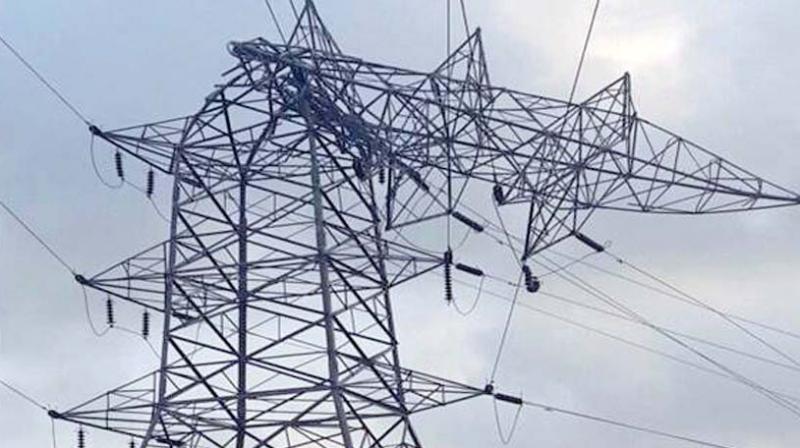Cyclone Vardah costs Tangedco Rs 1,000 crore
As many as 54 HT towers were damaged in the cyclonic winds preventing full-fledged restoration of power supply to the city.

Chennai: Tangedco has suffered a loss of Rs 1,000 crore following Cyclone Vardah which caused extensive damage to power infrastructure in the city and its suburbs on Monday making restoration of power supply to all the affected consumers a difficult task.
The damage to the power infrastructure is so severe the utility was forced to impose power cuts on a rotational basis in the areas where the power supply was restored due to collapse of major high tension towers supplying power to the city.
According to Tangedco sources, the preliminary estimation of loss amounts to Rs 1,000 crore with over 20,000 electricity poles, including 9,100 poles in Tiruvallur and 8,330 poles in Kancheepuram districts were damaged or uprooted, 54 high tension towers supplying power from the generating stations to source substations were damaged and about 500 transformers suffered damages.
Four days after the cyclone ravaged the city and its suburbs, several parts of the suburbs, particularly village Panchayats, were still in darkness, even as the power supply was restored in most of parts of the city.
As many as 54 HT towers were damaged in the cyclonic winds preventing full-fledged restoration of power supply to the city. “Since major towers have collapsed, we are getting power from only two sources in Chennai now. The Sriperumbudur to Taramani line, which is catering to the south and Alamatti to Manali and Mylapore.”
“Out of 2,500 MW of power required, we are now meeting 1,260 MW. We are giving priority to low tension consumers,” a senior Tangedco official said.
However, he said that the utility was forced to provide power supply on a rotational basis during peak hours to avoid overloading that might lead to total blackout.
“Till that time we repair at least two more towers we have to do rotational rationing,” the official said. The official appealed to the public to cooperate with the Tangedco in the power restoration works after massive destruction caused by the cyclone.
“Considering that we have restored the power in 36 to 48 hours after a massive cyclone, people should realise the situation and cooperate. If we overload the lines, it will be back to the dark ages,” he said, adding that about 13,500 workers, including 2000 workers from Andhra Pradesh, were working round the clock to restore the power supply.
According to the TN State Disaster Management Authority, over 6000 damaged or uprooted poles were replaced as on Friday. “We have completed 50 per cent of restoration works in the suburbs. The rest of the works would be completed by Monday. We have adequate stock of materials to replace the damaged ones,” said Electricity minister P. Thangamani.
‘Plant varieties that withstand calamities’
Five days after Cyclone Vardah devastated the greenery in the city, biologists and environmentalists urged the public involved in tree planting to choose native varieties that act as a feeding system to fauna varieties.
Studying of soil varieties — Pedology — plays a major role in selecting the flora varieties according to the habitat, opine biologists. “For Coastal regions like Chennai, relying on slow growing native varieties are the suitable option. Exotic varieties like Raintree, which were a majority of trees to be uprooted during the cyclone, do not serve the purpose in a longer run,” explained Dr V. Selvam, Director of M. S. Swaminathan Research Foundation. Native species like Jamun, Pinnai and Pala are climate resilient and has good sustainability, he added.
Experts also cried hoarse over the forest department’s move in planting the exotic tree varieties that are fast growing and yet vulnerable to natural calamities.
“The department does it to satisfy the political bosses and activists. Long term plans to accommodate the green cover is the need of the hour,” said Andal Ramachandran, an activist.
Environmentalists also feel that the mode of planting should be correct with adequate nutrition and space. “Saplings should be planted in a pit about 1.5 to 2 feet deep. By providing good space the root system will be strong,” said Shobha Menon, founder and managing trustee of NGO Nizhal.
Reiterating on the need for tree health management system and tree Act, she requested civilians to be involved in promoting green cover. “All the needs of a plant should be addressed. People should be aware of the type of trees to be planted in Chennai,” she added.

